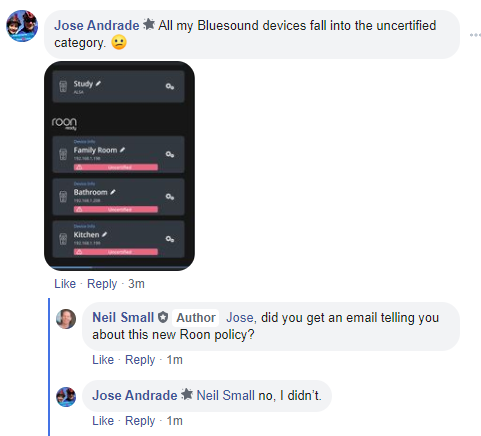We are seeing some confusion on the recent announcement about uncertified Roon Ready devices and September 21.
First and foremost
If you are currently playing to ANY device successfully, you WILL NOT LOSE ACCESS TO THAT DEVICE ON SEPTEMBER 21.
So, what happens on September 21st?
Well, before we talk about what happens, let’s confirm if you have an affected device. You can verify if you have an affected device by visiting Sidebar > Settings > Audio, and checking if you have a pink UNCERTIFIED banner that looks like this:
If you do not see this pink banner, you are not going to be affected. Enjoy the music!
If you do see the pink banner, you will no longer be allowed to “enable” that device after September 21st. This change will only affect newly installed Roon Cores, and any database resets. If the device is already “enabled” before September 21st, you will be unaffected.
If you have an uncertified device… now what?
First, DO NOT DISABLE IT or reset your Roon database. Disabling it will result in not being able to enable it again until the device is certified.
Next, reach out to your device’s manufacturer and ask how you will be notified when a properly certified Roon Ready firmware will be available for your device.
If your device is not certified, it most likely has issues that affect its performance, reliability, and/or overall experience. If you’ve not experienced any problems, then consider yourself lucky. Still, we certify devices across a much broader range of networks, audio formats, and use cases than any single person will use. This is the reason why the Roon Ready certification exists.
Why is this happening? I thought I was safe with Roon Ready.
The Roon Ready program, the RAAT networking protocol, and the certification process is all about creating trust.
The Roon Ready program and the RAAT protocol allows manufacturers to add audiophile-focused network streaming to their devices without sacrificing simplicity and reliability.
The certification program exists so that you can trust that the devices will work perfectly when they get to your house. During certification, we often find bugs that undermine the sound quality, networking reliability, and status of the current device (signal path and transport stuff).
A device that is “uncertified Roon Ready” means that it is in the process of becoming “Roon Ready certified”, but has not yet completed the testing and certification process.
Uncertified devices are not meant to be sold to the public, but instead only used by the manufacturers’ development teams.
Not every manufacturer obeys the rules, thus breaking the trust the program intends to create. If you bought an uncertified device, it means the manufacturer violated the trust we wanted to create and have violated the Roon Ready license terms. We currently call out those development devices with a pink banner, as you can see above, in hopes that no user is fooled into purchasing “beta” hardware.
We’ve been trying to get manufacturers to fix this issue for over two years and for every one that fixes the situation, two more break the rules. We had to draw the line somewhere, and September 21st is where we drew it. I guess this is just a side effect given the success of the program.
Every audio device manufacturer affected knows what’s going on and has chosen to prioritize other tasks over getting appropriately certified. We are shutting down this bad behavior before it gets out of control.
The good news is that 90% of the offending manufacturers have recently submitted new firmware or made other movements in their certification process. Many already had been certified, but the users need to be contacted to get new firmware (with bugfixes) for their devices.


